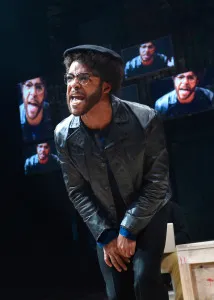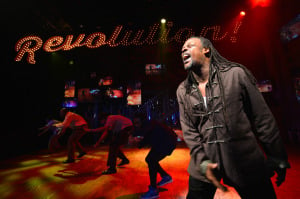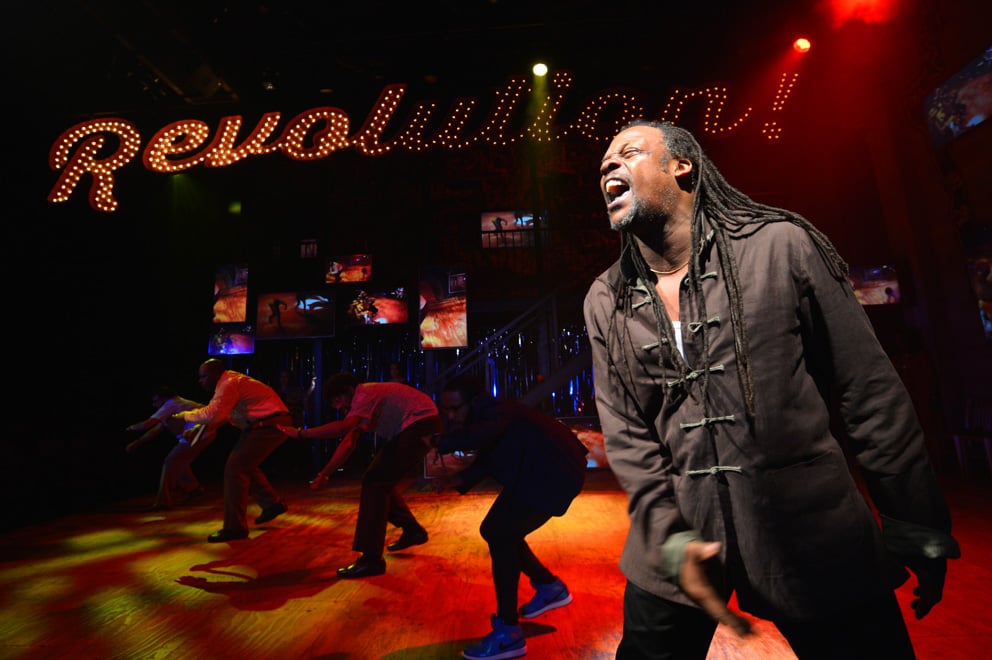“Power to the people.” This phrase is sung over and over in the exciting and thought-provoking production of “Party People” at Berkeley Repertory Theatre. The show examines both the Black Panthers movement and the Young Lords movement years later, by examining the aftermath – the falling-outs, the deaths, the betrayals – of the lives of those involved. By incorporating a “hyperkinetic mix of live video, hip hop, jazz, rock, gospel, blues, Latin rhythms and spoken word,” “Party People” is an exhilarating 180-minute ride that inspires, educates, and fascinates.

Created by UNIVERSES (Steven Sapp, Mildred Ruiz-Sapp and William Ruiz, aka Ninja), this piece premiered at the Oregon Shakespeare Festival in 2012. Based on real events (like Fred Hampton’s 1969 assassination by the FBI) as well as fictionalized characters, “Party People” fuses historical education with powerful questions about trust, justice and whether revolutionary fighting is worth it in the end.
The play tells the story of two young artists putting on an art exhibition about this strife that came before them – one had a father involved, the other had an uncle – as they attempt to make sense of their own legacy. They bring together friends and family – some of whom hadn’t seen each other since the movement dissolved – for one night at the art gallery, as stories are told, memories are shared and blame grows out of strong, unresolved emotions.
All aspects of the production, from design to direction to writing, come together seamlessly to make it a very compelling piece. Marcus Doshi’s scenic and lighting design are explosive and dazzling at some moments, with bright lights and a huge marquee-style sign spelling out “Revolution!” In other moments, the lighting becomes foreboding and eerie, as the scene shifts to the struggle of a man who was a “traitor of the worst kind” – he spied on the Panthers for the FBI – as he contemplates continuing or ending his life. Liesl Tommy’s staging maximizes the effect of the thrust stage, bringing the actors into the audience in some instances and creating dynamic, almost overwhelming, musical numbers at other times.
There isn’t a weak link in the ensemble, with every actor doing a stunning job embodying every single character he or she portrays, creating emotional authenticity along with stunningly beautiful and heart-wrenching singing.

In “Omar’s Rant,” Omar (Stephen Sapp) and the ensemble deliver an electric performance, in which he speaks about “praying for civil rights to be civil” while all the men in the cast frantically run back and forth onstage, trying to do all they can to keep their heads above the water. He curses the system that doesn’t provide justice until you’re dead, providing “just a little profanity to go with this insanity,” as his spoken word poetry and singing is interspersed with the Declaration of Independence, which seems to mock the group’s fight for the unalienable rights it is supposedly granted.
This song, in some ways, is a microcosm of the play itself. It brings in historical truths and ties them specifically to these nuanced and three-dimensional characters we see in front of ourselves. It doesn’t just bring powerful emotion, but also a physical manifestation of the struggles endured by these groups. It weaves history intricately with an engrossing narrative. It can’t be described in words, but only experienced.
“Party People” tells the story of what happens when people strive for their basic civil rights above all. The story that emerges lives in a complex gray area, but at his or her core, each of these people only have the simplest needs: “Land, bread, housing, give us justice, give us peace.”
Party People runs through Nov. 30, 2014 at Berkeley Repertory Theatre. Information on student discounts can be found here.
Contact Noemi at noemi11 ‘at’ stanford.edu.
